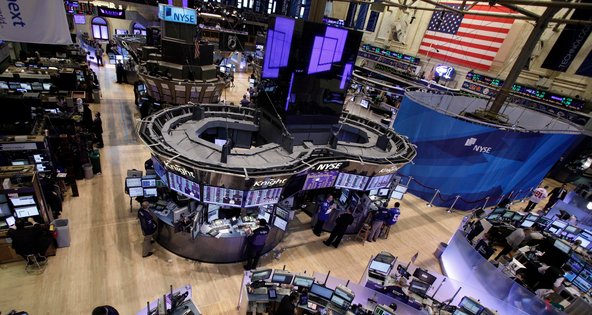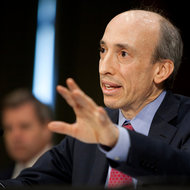 Richard Drew/Associated PressThe normally busy trading floor will be empty on Monday.
Richard Drew/Associated PressThe normally busy trading floor will be empty on Monday.
12:50 a.m. | Updated
All United States stock and options markets will close on Monday as Hurricane Sandy approaches, as Wall Street braces for the storm to barrel through the heart of the country’s financial center.
The decision, made on Sunday night, leaves the American stock markets closed for weather conditions for the first time in nearly three decades. The New York Stock Exchange had previously planned on closing only its physical trading floor, while allowing for trading on its Arca electronic exchange. It has now decided to halt all trading.
The Nasdaq and BATS stock markets, which are built on electronic trading, also decided to close. The CME Group, which operates the Nymex commodities exchange, said it would halt trading on its physical commodities floor and on its electronic stock futures and options exchanges.
Related Links
The Securities Industry and Financial Markets Association, or Sifma, said in an e-mailed statement that it was calling for bond trading, which is all done electronically, to close at noon Monday, though it left the final decision to member firms.
The N.Y.S.E. last closed trading for weather reasons in 1985, when Hurricane Gloria lashed the metropolitan area. The opening of trading has been delayed a number of times, including during a blizzard in January 1996. The exchange was closed for three days after the terrorist attacks on Sept. 11, 2001.
Hurricane Sandy Multimedia
Since then, the business has largely moved onto electronic systems that are meant to work without the traditional army of floor specialists barking out orders. Exchanges had hoped that computerized platforms would allow the markets to open without endangering even a smaller number of staff members.
But after daylong discussions with city and state officials, brokerages, the Securities and Exchange Commission, the Federal Reserve Bank of New York and Sifma, the market operators decided to be even more cautious and halt trading for the day, according to a person briefed on the matter.
“We support the consensus of the markets and the regulatory community that the dangerous conditions developing as a result of Hurricane Sandy will make it extremely difficult to ensure the safety of our people and communities, and safety must be our first priority,” the N.Y.S.E. said in a statement on Sunday.
The decision came late: Nasdaq made its final determination around 10:30 Sunday night, according to a person briefed on the exchange’s decision.
Under the N.Y.S.E.’s contingency plan, traders would have routed their orders onto the company’s electronic exchange, while electronic options trading would operate normally. Volume was expected to be muted, and the decision over whether to open on Tuesday was to be determined later.
A spokesman for the N.Y.S.E., Robert J. Rendine, said the company’s data center in Mahwah, N.J., which handles all trade orders, is intended to withstand a storm of Hurricane Sandy’s strength. It also has generators and enough fuel to run for almost a week at current levels, with emergency plans in place to procure more fuel if needed, he added.
Since 2007, the N.Y.S.E. has offered a “hybrid” model that allows trades to be completed either by humans or by computers through the Arca system. That gave the exchange a contingency plan that was previously unavailable, said Duncan L. Niederauer, the chief executive of NYSE Euronext. The company has tested the backup plan regularly, most recently in March.
Many big banks are letting their employees work remotely, mindful of the suspensions of major transit systems and school closures.
Goldman Sachs and Citigroup said their major offices in Lower Manhattan — which house the firms’ enormous trading floors — would be closed to all but essential personnel. Some Goldman staff members will be asked to work from special centers in Greenwich, Conn., and Princeton, N.J., though the majority of employees at both firms will be allowed to work from home, according to internal memorandums.
“Citi has contingency plans in place including locations that can be utilized to ensure continuity of operations,” Shannon Bell, a spokeswoman for the firm, said in an e-mail statement. “Citi is committed to providing uninterrupted service to our clients during the storm and seeks to minimize any possible impact.”
JPMorgan Chase plans to close an office in Lower Manhattan that is in a potential flood zone, though its other offices will remain open and ready to run off backup generators if necessary.
Decisions on which Chase retail bank branches would be closed were still being decided on Sunday night, according to a person briefed on the matter. Chase also said it would waive overdraft and late fees for customers in seven states affected by the hurricane, including New York, New Jersey and Connecticut.
Ms. Bell of Citi said that the firm’s branches in affected areas would be closed.
Several of these firms plan to run some of their technology and trading operations through offices in Europe and Asia.
A version of this article appeared in print on 10/29/2012, on page B1 of the NewYork edition with the headline: Bracing for Storm, New York Stock Exchange to Close Trading Floor.
Article source: http://dealbook.nytimes.com/2012/10/28/nyse-plans-to-close-its-trading-floor/?partner=rss&emc=rss


